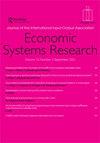Consumption structure optimization for reducing energy footprint
IF 1.6
4区 经济学
Q2 ECONOMICS
引用次数: 0
Abstract
To investigate how to obtain the optimal balance between energy consumption and economic development, this paper proposes a multifactor optimization model (MFOM). Different from previous input–output optimization models, our proposed MFOM comprehensively considers the direct and indirect impacts of sectoral consumption activities on total energy consumption. The results show that MFOM achieves higher energy-saving goals by smaller adjustment to consumption activities than the previous input–output optimization models do. The results also show that the consumption of some products should be limited to achieve the energy-saving and economic growth goals, such as Non-ferrous Metal Ore Mining, Chemical Products and Ferrous Metal Ore Processing. Furthermore, the results indicate that the share of some sectors, especially high-level manufacturing sectors, significantly decreases in the consumption structure after optimization. To maintain the sustainable development of these sectors, the dependence of their production activities on energy-intensive products should be reduced.优化消费结构,减少能源足迹
为了研究能源消耗与经济发展之间的最优平衡,本文提出了一个多因素优化模型(MFOM)。与以往的投入产出优化模型不同,本文提出的MFOM综合考虑了部门消费活动对总能源消耗的直接和间接影响。结果表明,与以往的投入产出优化模型相比,MFOM模型通过对消费活动的较小调整实现了更高的节能目标。研究结果还表明,为实现节能和经济增长的目标,应限制部分产品的消费,如有色金属矿开采、化工产品和黑色金属矿加工。优化后,部分行业尤其是高水平制造业在消费结构中的比重明显下降。为了保持这些部门的可持续发展,应减少其生产活动对能源密集型产品的依赖。
本文章由计算机程序翻译,如有差异,请以英文原文为准。
求助全文
约1分钟内获得全文
求助全文
来源期刊

Economic Systems Research
ECONOMICS-
CiteScore
5.60
自引率
4.00%
发文量
17
期刊介绍:
Economic Systems Research is a double blind peer-reviewed scientific journal dedicated to the furtherance of theoretical and factual knowledge about economic systems, structures and processes, and their change through time and space, at the subnational, national and international level. The journal contains sensible, matter-of-fact tools and data for modelling, policy analysis, planning and decision making in large economic environments. It promotes understanding in economic thinking and between theoretical schools of East and West, North and South.
 求助内容:
求助内容: 应助结果提醒方式:
应助结果提醒方式:


